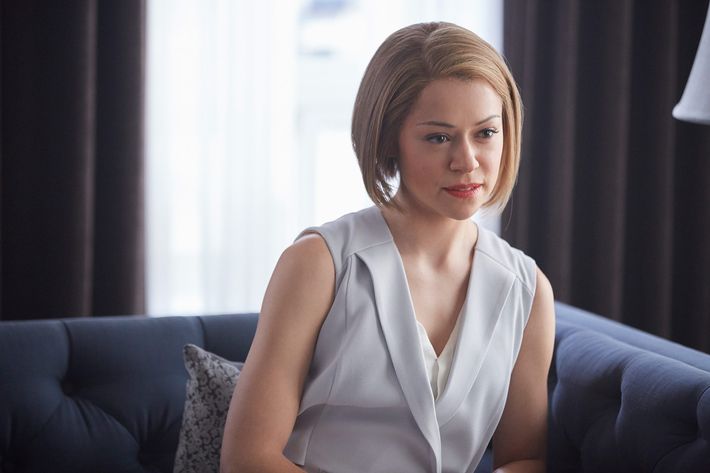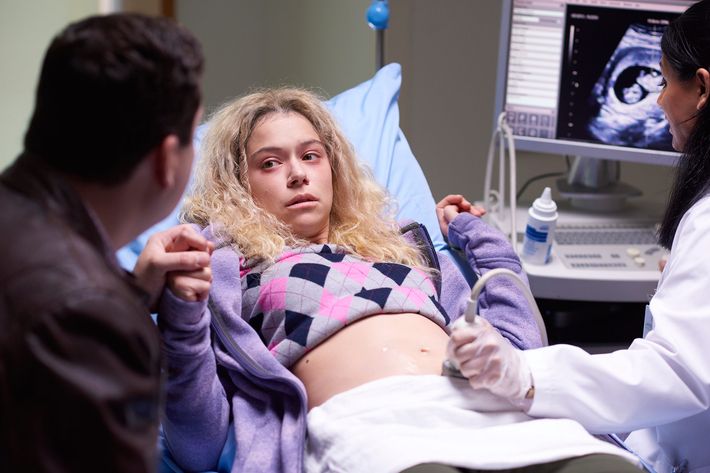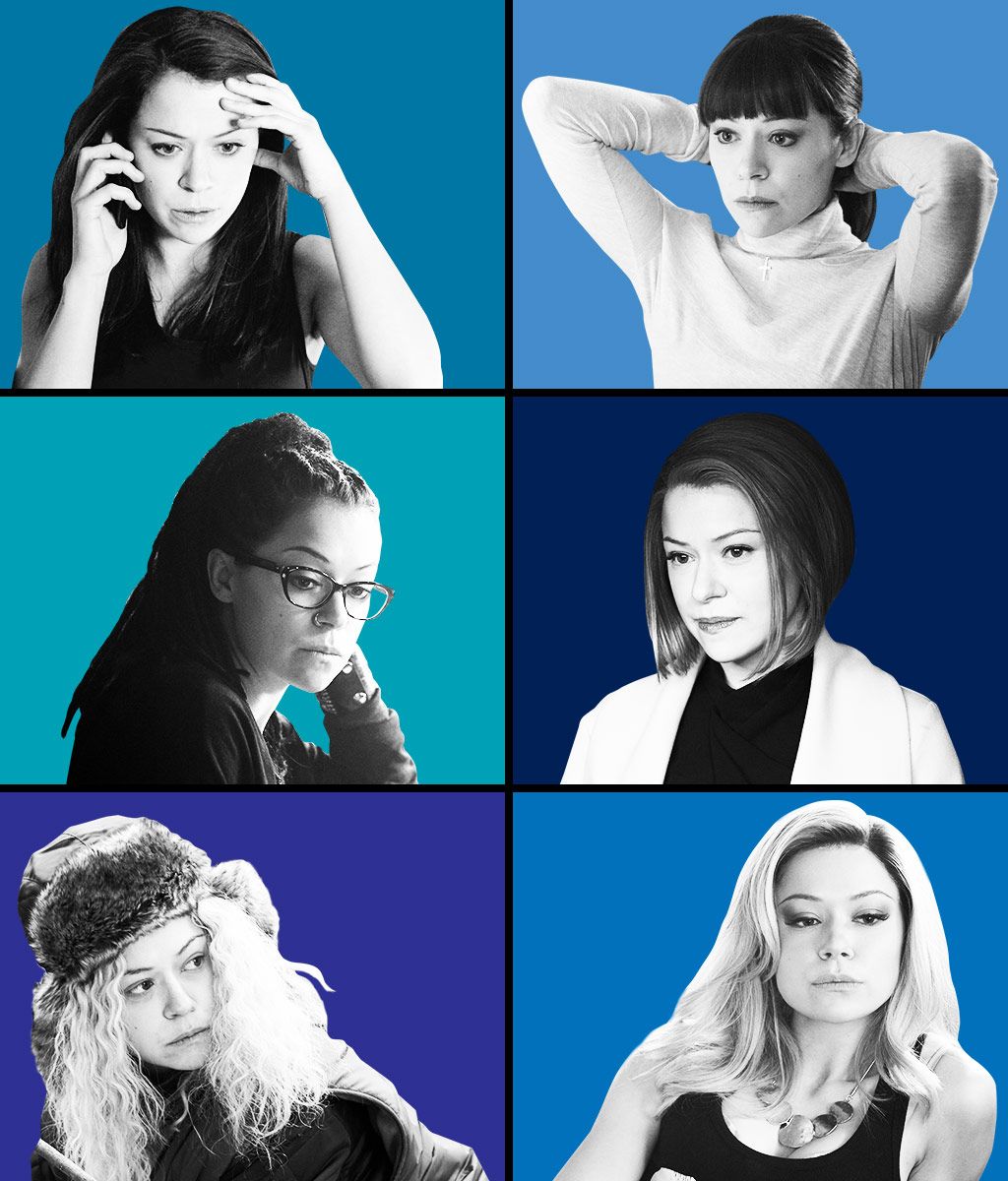When I arrive at a soundstage on Orphan Black’s Toronto set, the crew members tell me to sit back and take it all in because today is a Sarah Manning day. What they mean, in part, is literal: Tatiana Maslany is playing the Sarah Manning clone, the protagonist of the series and the viewer’s proxy into the wide world of cloning. But what they’re really saying is, whichever of the many clones Maslany happens to be playing determines the vibe of the set, and a Sarah Manning day is more relaxed. Maslany herself shuffles over to me and says, “They’re very low-intensity scenes, so you can chill out.” She’s wearing a black hoodie and is about to film an interstitial scene where Siobhan (Maria Doyle Kennedy), Sarah’s wolf pack mother, watches over Sarah and Kira as they sleep on the couch. There’s no dialogue, but the director, Aaron Morton, runs through the scene a few times, asking Kennedy not to move around too much in the armchair. Maslany can take it easy and feign sleep. One of the show’s creators and executive producers, John Fawcett, watches from the video village nearby when he notices just how still Maslany gets. “I think Tatiana actually fell asleep!” he laughs.
You could forgive Maslany for squeezing in a 40-second power nap. On Orphan Black, which began its fifth and final season Sunday, she performs the astounding feat of not only playing the protagonist, but also most of the other principal characters. The gambit of the show rested on the ability of one actor to don the guises of almost a dozen different clones including Helena, a Ukrainian murderess with an appetite for cold butter; Alison Hendrix, a former pill-popping cardigan-lover; and Cosima, a crunchy scientist dying of a mysterious terminal illness. Maslany’s ability to disappear into each clone becomes more evident when you watch them interacting with one another: They’re fully realized, individuated characters who have remarkable chemistry with each other — look no further than a scene in the season-two finale when the sisterhood of Sarah, Cosima, Alison, and Helena dance together with abandon. It’s that performative dexterity that has spawned a die-hard fan base called the Clone Club, critical accolades, and, finally, earned Maslany the Emmy for Best Actress in a Drama last year.
It’s hard for Maslany to articulate how exactly she inhabits each character. She’s more likely to try to get her point across with sounds or head bobs, as I learned when I met with her in a conference room on set after she did a half day of scenes as Cosima, her hair loosely twisted at the front to mimic the character’s dreadlocks. “There’s an internal rhythm of a character,” Maslany says, looking cozy in a fuzzy, oversize sweater and sweatpants. “We all have a different song that plays through our body, and that’s helpful in finding unconscious, new ways of moving that aren’t intellectualized, but more instinctive.” For instance, as London con woman Sarah Manning, Maslany listens to a lot of what she thinks the character would have listened to growing up, like Dizzee Rascal and The Streets. The song that really captures Sarah though is the Prodigy’s “Breathe.” “Something about that drone at the beginning, the like duh-duh-duh-duh,” she hums, tapping along on the cool, metal table. “That was Sarah. Anytime I was like, I don’t know who she is, that song somehow got me there.”
Early on, Maslany implemented an extensive process for getting into character: Each major clone had her own playlist that she would listen to during hair and makeup, which could take 60 to 90 minutes. For Alison Hendrix, it was all about Broadway show tunes and ballet moves. For Helena, she liked listening to Tom Waits for “the gravel bass demon thing he does” and Anohni’s early records released as Antony and the Johnsons like “You Are My Sister.” I tell her how much I love the second album, I Am a Bird Now, and start to tear up as we talk about the lyrics from “Cripple and the Starfish”: “And it’s true I always wanted love to be / Filled with pain / And bruises.” “That’s exactly what it is,” Maslany says. “The power of a musician to transport you to a place where your heart just opens up and you feel everything and you don’t even know what it is: That album was the opening of Helena’s heart.”
Just as Maslany resets her internal rhythm for each character, it also determines the pulse of the set. This is in part because she would remain in character between takes, particularly during the first two seasons. “Every single character was a different directing challenge, because you would have to speak to them differently,” says Fawcett, the co-showrunner who has directed a bulk of the episodes. “You would be forced to, because she played the character to you as you were giving her the direction, and she stood there listening in the accent or the voice. Every day with those characters was a unique experience. I grew to love directing all of them, but the most fun I have directing is likely with Alison. It’s like hanging out with my sister.”
“It can make conversations [with her] feel either more friendly or less friendly or more familiar or less familiar. It’s peculiar,” adds Jordan Gavaris, who plays Sarah’s brother Felix. “Alison I find very easy to relate to. Sarah is heavy. Cosima is lively, but there’s a little friction.”
Graeme Mason, a writer and co-showrunner of the series, remembers being introduced to Helena for the first time. “There was this new character skulking amongst the crew: Tat in her army coat in character,” he recalls. “Nobody wanted to go near this killer she was inhabiting. And then slowly Helena became the crew’s perverse favorite.” Who was the most difficult? “The character I least liked giving notes to is Rachel,” says Mason. “Nobody likes giving notes to Rachel.”

That’s likely because Rachel was also the most difficult clone for Maslany to master. “I didn’t even know I was going to be playing Rachel until episode eight of season one, and she came up in episode ten,” recalls Maslany. Rachel Duncan is the self-aware clone who was raised from birth knowing who she was. She’s exacting and merciless — a real terror. “She was this CEO — corporate, wealthy, entitled, upper class — all this stuff that I was like, no, no, no. I don’t know this. I have never done this, and would never be seen for this in any other capacity, casting-wise,” she says. “She was terrifying for me.”
Kathryn Alexandre, who works on set as Maslany’s acting double, says “it’s very quiet on set when she is playing Rachel. It’s a very different vibe, because it isn’t as welcoming to approach her. The crew feels the iciness, and that energy infuses everyone.”
Later that day, Maslany is set to do a clone change into Rachel. I ask if I’d be able to stick around to watch, but am promptly denied. “She’s protective of some characters,” one crew member tells me.
In a story Tatiana Maslany told Seth Meyers on Late Night, she arrived at her audition for Orphan Black on rollerblades. “I was terrified of going there and being the hot, sexy lead of a show — that’s not me, I’m not going to try and do that,” Maslany tells me. “I’m going to do what I do, which is rollerblade to an audition so that I’m breathing. There’s something disarming about it; it gets you in your body. I know that I’ll be sweating. I’m not going to be cold.” She had to play four characters that day: Sarah, Sarah pretending to be Beth, Cosima, and Alison.
“The thing that struck us right away when she stepped in the room was she could pivot incredibly quickly off of John’s directing notes,” says Mason. “She’s in an audition process where she literally has to play different people with three different accents. She managed to bring a distinct physicality, even in those very early moments.” Fawcett adds, “We looked at other actors and other performers, and they could often do one character really well or maybe two, but there wasn’t anyone that even came close to doing four with accents. At the end of the day, there was no contest.”
Maslany’s improv background (she’s a certified trainer!) has something to do with her nimbleness as a performer. When she played Alison, Maslany would improv during scenes with Kristian Bruun, who plays her character’s husband, Donnie. At the end of season two, when Donnie accidentally kills Dr. Leekie, the two had to film a scene where they decide to bury the scientist’s body in the garage. The director, T.J. Scott, had three cameras rolling and told them to let it rip: They had to get the body out of the freezer, wrap it in a shower curtain, and get it ready for burial. “They just gave us that whole chunk to improv and fuck around with in the garage,” says Bruun. “That’s a very trusting thing for a TV show to do.”
Improv also gives Maslany the space to figure out a new character. She initially had trouble understanding the Finnish clone, Veera (also known as MK), introduced in season four, so she asked her acting double, Alexandre, to act out the scenes with her. “She would look at MK objectively when I was improvising as her, just trying to figure that character out and how she looks to other people,” says Alexandre. “That’s when she discovered MK had an obsession with time, and only being able to see people for a certain amount of time. She was very regimented, very scared, always on the lookout.”
This was always what Fawcett and Mason had in mind: an actor who wasn’t just playing a version of herself, but rather one who had the ability to create whole characters from scratch. “Our idea always was, we wanted our gimmick to be invisible,” said Mason. “We wanted nobody to know special effects took place. So to do this, it had to be seamless, it had to come from a place of acting the part, and that’s the only way it becomes invisible. If the gimmick doesn’t work, then the show only lasts one season.”
The “gimmick” in this case is a laborious technique with a specialized Technodolly nicknamed “the Time Vampire” for scenes with multiple clones. It requires them to do at least three shoots for one scene: First, they do multiple takes where Maslany plays one clone, with Alexandre as the other; then they run it through with their roles swapped; and, finally, they film it again for background. “A quick two-Tat scene would take 12 hours to shoot, and it’s only a couple of pages of dialogue,” says Bruun. “That’s an insane day.” On top of that, Maslany also became a producer on the show in 2015, at which point she started working more closely with writers to help flesh out the characters. “There’s a whole other litany of issues she’ll be faced with on the weekend or a Monday morning,” Gavaris says of her producing duties.
It’s dizzying to think about just how much Maslany works, but she seems to thrive off the buzz and jam-packs her schedule accordingly, rarely leaving room for a break. After wrapping the last season of Orphan Black, she filmed the movie Stronger where she plays a victim in the Boston marathon bombing, and immediately started morning runs to get into the mind-set of her character. During the previous break between seasons, she did two films in a row: Two Lovers and a Bear and The Other Half. The year before that it was Woman in Gold. Which is not to mention the press junkets and publicity she does to promote all of that work. “She’s a workaholic. She’s so jacked up from filming that she’s lucky if she gets like five hours sleep or six hours sleep,” says Bruun. “I don’t understand. She’s this little sparkplug of energy.”
Before and after the Emmy Awards last year, Maslany still attended acting class with Gavaris (it’s something they do regularly together). “The fact that she could, the day after she wins an Emmy, go to a class and work a technique she maybe hasn’t practiced in its entirety, and risk failure publicly in front of people who are her fans — that’s something to aspire to,” says Gavaris. “Her love of what she does is just so obvious: Emmy or no Emmy, it doesn’t matter.”
Still, she won an Emmy, and it might have been one of the first times Maslany looked flustered: When she got to the stage, she said in a sing-song voice, “I should have had this written down.” In fact she had written it, it was just on the Notes app on her phone. “I never thought, ‘Maybe I should write this on a paper because if I do win, it means I have to go onstage and say this.’ So then when I won, I was like ‘Shit.’ I brought my phone up,” recalls Maslany. “I also had to put in my pass code and suddenly I was like, I don’t remember my pass code. Everybody’s waiting for me to like get this over with, and my phone was going like drrring, drrring, drrring because people were texting me ‘Congrats!’ and I was like ‘I can’t read what I wrote!’ It was so dumb.”
The one skill Maslany has yet to master is how to decompress. “Still trying to figure that out,” she says when I ask her what she does to relax. “A lot of my friends have babies right now, and I like to stare at babies and talk to babies. But that’s my biggest thing: ‘How do I shut this off?’”
The first time Maslany saw herself in costume as Helena, the Polish émigré, she wept. The showrunners had originally dreamed up Helena as more of a villain figure with a Helena Bonham Carter à la Fight Club look (she does do a lot of villainous things, like murder people). But Maslany felt something kindred, and instinctively understood that Helena was more than just an archetypal sociopath. “From day one, I was like, everything for her is love — even the murders, it’s searching for love,” she explains.
So when Maslany got into the makeup chair and, after about an hour and a half, saw Helena for the first time, “I burst into tears, because I was looking at this woman who wasn’t me but … I don’t even know, I can’t even explain what it was. There was something about it that I was like, Ugh, I feel that. I feel her pain, I know who she is. It was such a visceral thing.”

Maslany feels protective of all of the clones, but some more than others – like Helena, or Krystal Goderitch, the aesthetician who loves kickboxing and an animal print. Maslany knows what other men — and women — think of her when they see her. “When I’m Krystal I’m like, don’t fuck with me because I know that this girl invites certain attitudes or certain assumptions or certain behavior from men, women. I’ve felt that,” says Maslany. “I know people go like, ‘But she’s not really smart, right?’ She just has a logic that is different from the other girls. She figures out more than I would have ever figured out.”
It’s through playing all of these characters that Maslany herself navigates the ways the world puts women into boxes. This becomes particularly relevant in the fifth and final season of Orphan Black, where there’s a patriarchal figure looming over the narrative. “The interesting thing is the way that patriarchy chops us,” says Maslany. “All I could think about was the way we cut women into pieces, and parts of us have to be forgotten or only parts of us are okay. That concept became very apparent halfway through the season, and it also happens with the sisters — they’re all very divided. They’re chopped into sections. One is over here. And one’s over here. And one’s over there.”
For Maslany, the joy of acting is the challenge of discovering new parts of herself — new ways of talking, walking, moving, and breathing so that all of the characters live inside of her. If they begin from a point of archetype — suburban mom, hippie, ditz — she works to push them past those confines. This is perhaps why her performance has resonated with so many fans, and women in particular: because Maslany shows that you can, indeed, contain multitudes.





